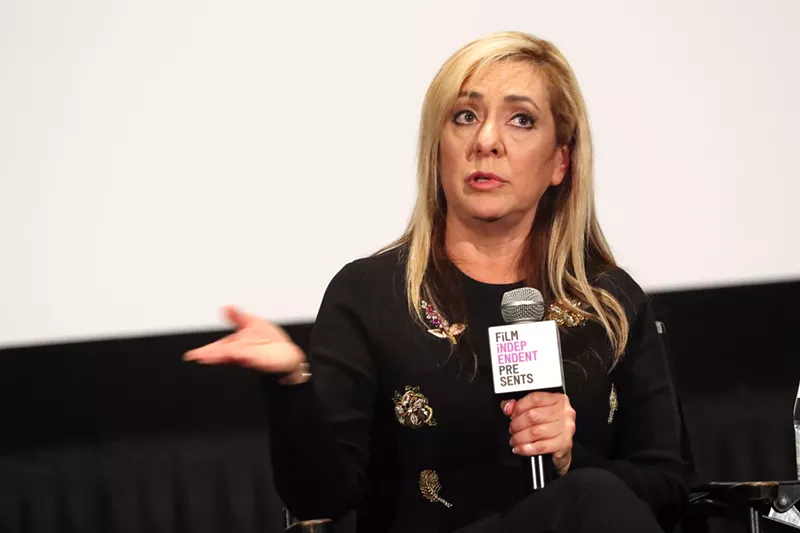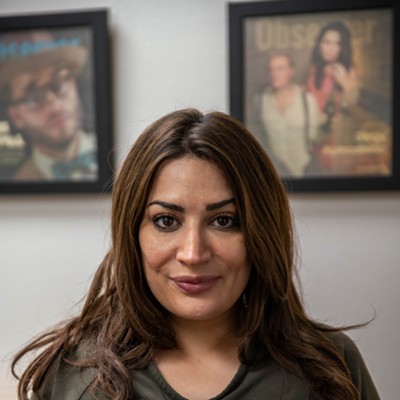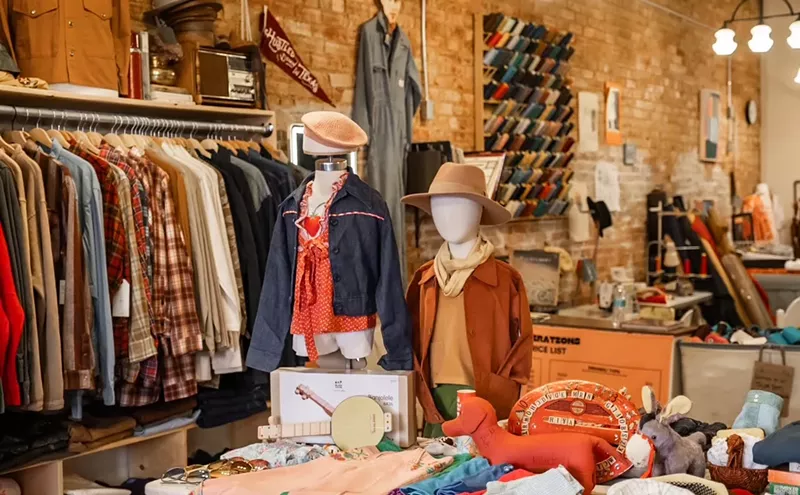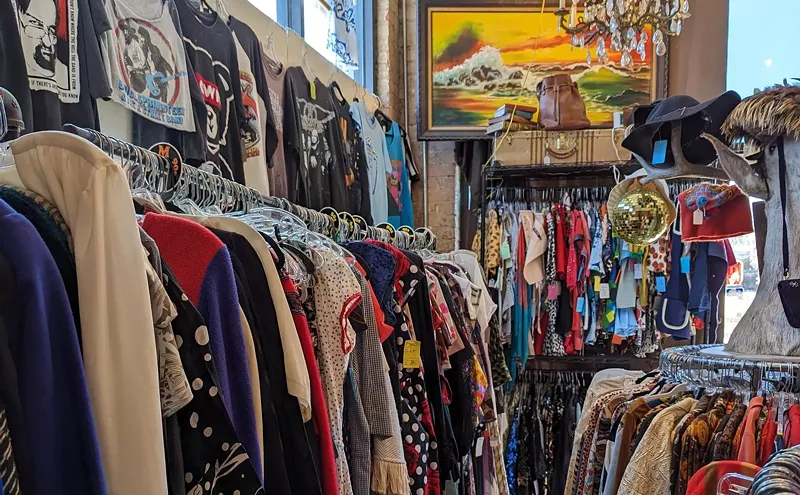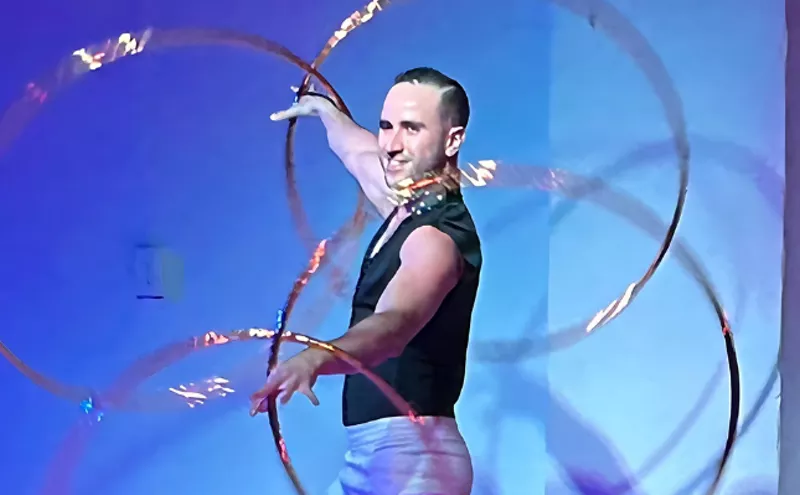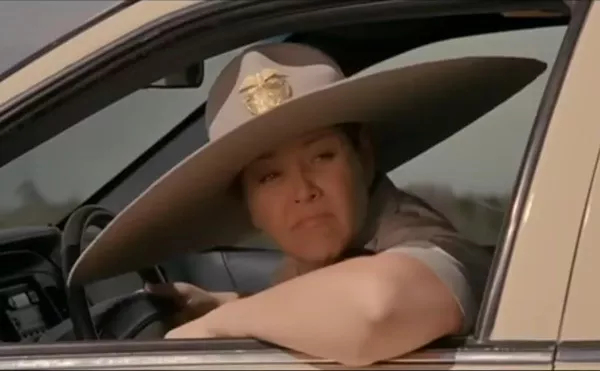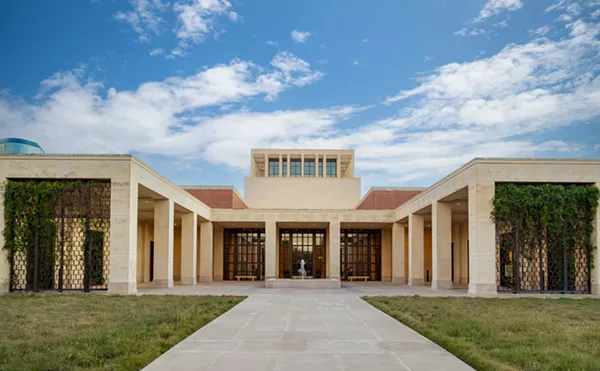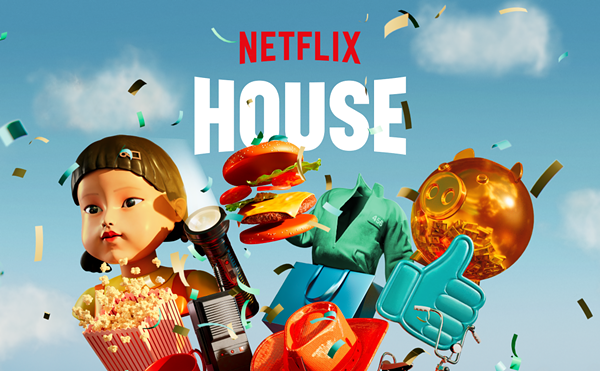Both Bobbitts were charged and subjected to individual trials (John for marital sexual assault, and Lorena for malicious wounding); both were found not guilty.The Bobbitt scandal took place at the intersection of tabloid fodder and widespread public misconception, while split opinion painted Gallo into an icon; lauded as a feminist hero, or contrarily a villain. The name "Bobbitt" became a punchline; a reductive meme in culture that even today could be identified and summed up with two emojis.
Lorena, a four-part documentary produced by Jordan Peele which premiered on Amazon in February, attempted to bring light to the facts surrounding the Bobbitt trials. After John Bobbitt’s penis reattachment surgery, he embarked on a short-lived career in porn and was later convicted of theft and for battery against two subsequent partners. Gallo has since remarried and raised a now teenage daughter, and become an advocate against domestic violence and sexual assault.
Gallo spoke with the Observer via phone ahead of her appearance at the Tech to Empower conference in Arlington, running from Oct. 28-30, which examines the roles that technology, social media and film influence and portray domestic violence. The following interview has been edited for length and clarity:
First, can you tell us about the conference and what you'll be speaking about?
I'm very excited to be part of these events from the Texas Council on Family Violence because it is very important for us to raise awareness as a community to get involved. I do have a foundation as well, The Lorena Gallo Foundation, and the mission of my foundation is basically to raise awareness and offer education to diminish the impact of domestic violence, for survivors and victims not only here in the United states but in the world. I believe that domestic violence is a complex problem that doesn’t really have one single solution, so we as a community need to stand up against the issues of domestic violence to find a solution. So that's why it is very important to develop more resources and engage more in the community to help destigmatize abuse in a relationship. I will do a plenary with [journalist] Melissa Jetsen, who I had the honor to meet her a long time ago because she has been a friend basically, and she works with Huffington Post. The plenary is going to break into different sessions and I will have a session as well. People can actually choose to go to different sessions and I will be the speaker at that session.
As you said, it’s very complex, but where do we start in trying to protect women and children from domestic abuse?"Being a Latina, they used to portray me as a hot-blooded Latina in the tabloids. I believe that had some effect in my trial ... and also to be actually a woman affected my case." — Lorena Gallo (formerly Bobbitt)
tweet this
Well, it's very important to have education, and that's why it’s very, very important to reach out to the community. We’re not only advocates but activists who actually wanted to change, to destigmatize, the way how domestic violence is a taboo issue. Yes, we have the MeToo movement and Time'sUp and WhyIStayed and WhyILeft —those are movements that have helped destigmatize sexual violence and sexual harassment, but there's still much more to do. I believe that with the help of the community and engaging the community... and education is huge, and that’s why we do this event; to be able to educate the public who are no longer engaging in those critical issues. Domestic violence is a social epidemic and a public health epidemic as well. So I believe it’s very important to educate the whole community and to help them see the need for more events like this.
Where do you think it starts, with sexism, patriarchy…?
Yeah, for example for me, I grew up in the culture of the machismo culture, obviously coming from, as a Latina from South America. I believe that trying to find a common ground — men and women, you know, actually have this problem of gender equality and I believe that if we were treated equal we wouldn’t have these issues of domestic violence and sexuall abuse. Again, it goes back to education. But yes, we live in a patriarchal society, where there’s a lot of things… for me, also, I have a problem when people say "this is a woman’s issue.” This is not a woman's issue only, because men and women also should be involved, and men are also victimized. We talk about women because statistically there are more women abused than men, of course, as are children. So to me it’s very important that we talk about this issue and not to make a reference to it as a woman’s issue only. A lot of men feel that because it’s a "woman’s issue" they’re afraid to talk and be open about it and they are victimized as women, for example. So it’s very important to understand the cycle of abuse, and to educate people is a priority. So yeah, a machismo society and culture has a big influence on domestic violence. For me also, I’m a religious person and I was very ashamed to talk about it. My religion had a big influence on me too, and as a culture as a Latina, we are constantly afraid of deportation, A lot of immigrant women don’t go to the police because they’re afraid that they’ll immediately get deportation status. A lot of women who have children are afraid to lose their children that way.
Do you think your status as an immigrant affected your case?
Yes, it did affect my case, because I believe the media actually had an opportunity to sensationalize the case and being a Latina they used to portray me as a hot-blooded Latina in the tabloids. I believe that had some effect in my trial, yes, and also to be actually a woman affected my case. Again, we go back to the patriarchal society in which men have more power over a woman and that had a lot to do with it. In my case, Virginia in the ‘80s did not have the law to support marital rape so it was in the ‘90s when they started to see marital rape as criminalized cases of sexual assault.
How do you feel the case would've been seen after the MeToo movement?
After the MeToo movements and after all the movements that came out, I think society and the media, feels more sympathetic and empathetic about these issues of domestic violence and sexual harassment and sexual assault, because the MeToo movement helped destigmatize sexual harassment and sexual assault. So yes, my case happened 26 years ago, it didn’t happen in this era. 26 years later, I think the outcome of the trial would be different if maybe John didn’t have a conviction.
I’d imagine that for context in events like this one, a lot of people still refer to you by the last name Bobbitt. Is it hard to detach yourself from the name altogether?
Oh, no. Absolutely. I was not born Bobbitt, I was born Gallo. It’s an italian last name and I'm proud of my heritage: Italian, Spanish...Latina. But this is my platform. My last name Bobbitt is what makes me to come up and speak on this very critical issue because it holds the attention, and after the documentary it’s even a larger platform, of course, for me to be able to actually step up and reach out to a larger community of even more people, so it doesn’t bother me.
During the trials you were perceived as a feminist hero and a villain. At the time, which did you feel most strongly, the public support or the criticism?
Both. The tabloids... I read the headlines, and I couldn’t really avoid them because they were in my face and people talk about them, of course, but the whole country was divided, really. Women were with me and supportive, and activists and advocates were with me, and I heard a lot of support and I received written hand letters that were supportive. And the Latin community was outside of the courthouse. So I did feel the support even though my family was in South America, I did feel their support. Also, it was divided. Men were against me, obviously, there was a gender issue there, too. So yes, I’d seen and I’d heard, and like I said I didn’t really spend much time watching TV or listening to the news because my advice, my attorney’s counsel, he advised me not to, because I was already in a very exhausted, and draining...mentally, going through a trial is not fun. It’s very traumatizing, going through the whole process of victimization. Staying in the hospital. You know, they tried to protect me. People that surrounded me protected me saying 'hey don’t watch, don’t read anything.’ So I wasn’t really caught up on that, so I didn’t really feel, you know, anything or any emotions about whatever. The public was talking and media was talking, so I wasn’t really connected with them.
How do you feel about the current administration and its stances on women and immigration?
It’s, you know, recently I know a couple of immigrant survivors have been in the news because this administration is no longer allowing people to apply for asylum in the United States, and they’ve been suffering domestic violence in their home countries — so as an immigrant woman, like I said, I was very scared to call the police for help, my husband always said to me to call the police, and threatened that they would detain me and have me deported. This is the fear that many undocumented women fear, and immigrants. In relationship to that, immigrant mothers — like I mentioned before — they’re very very afraid to lose their children, so the new generation of Latinx community I believe have many challenges, getting help with domestic violence and sexual assault from the justice system, because due to the complexities of these issues — mainly inconsistencies in the policies that affect immigrant survivors — and the courts, as well as the police and the lawyers, the lack of knowledge about how to handle cases where the victim is afraid of getting involved due to the immigration status. That’s why more education about domestic violence and immigration is so important; it’s actually necessary, no longer important. More people in our society and organizations are taking more active roles in saying things on domestic violence. I remember back in the ‘90s there were not many resources available to help victims and survivors of domestic violence. For example, there were many shelters that would call the police [on undocumented victims]. I don’t know if you saw the documentary... there was a lady there saying "even if Lorena called I did not have the resources. I did not know where to send Lorena." There was only one shelter in my community that was not even for domestic violence; it was for homeless, and so that changed after that. They had fewer staff and fewer programs and couldn’t help. Another big change was the power of the Internet and social media, that we didn’t have back then. Now we also have a 24-hour news cycle that started in the 1990s and now we have tools available to everyone that allow them to start actually start conversations.
A long time has passed since the trials. Have you been able to live a relatively anonymous life? Do people recognize you daily?
I actually could’ve been away from my community but I would’ve been recognized everywhere I go, so I decided to stay in my community because I knew the people, I knew the community, the community already knew me. You know, accepting is an amazing thing to do — Obviously I needed to get help and I had to go through a lot of taking care of myself, "it’s time to take care of Lorena." And to be able to accept yourself and recognize who you are and think that we can make changes and to help make changes in my own community, working in the shelter during the whole time, it has been an amazing healing part of my life as well. So I don’t live with that stigma of being recognized everywhere because, again, acceptance is part of the journey.
In terms of recovery, what are some forms of treatment, like therapy, that you have found have been helpful for victims while trying to recover from PTSD or abuse?
As a survivor of domestic violence myself I didn’t want anyone to go through the same things that I experienced, basically. To me, talking in the shelters about all the horrible abuse that I went through and how I recovered, if it helps at least one person to escape domestic violence then obviously the trauma that I felt was not in vain — I’ve always said that. And so I am an activist and an advocate, I work in shelters and I want to reach out to those who are in an abusive relationship to speak out, and for those who don’t have a voice by sharing my story. I’ve had the opportunity to help educate others about those issues like sexual assault and domestic violence and I am very humbled to be able to work and be a facilitator in shelters around my community because I can see the difference, how they have hope, by talking to all these survivors. We have a community of survivors who help others to come out of domestic violence, so, to me, it’s very important to continue this, to talk — and it was healing to hear the stories about survivors in the shelters. Actually, a good part of the healing process is to be able to start telling the story. So silence to me is not an option. I cried about that, and I am able to become again stronger because of talking about this issue.
How did you feel about the Amazon documentary series, Lorena? Anything you feel was left out?
Oh no, they basically they did their job. I’ve been very lucky to work with them and to actually have found them because it gave me a platform to really tell the story then, and so it’s amazing actually that they did the research that’s in the documentary with a factual event; nothing that was left out. Well, actually some events were left out, but most of the things they covered. I like the part that they give that example of Anita Hill and Clarence Thomas, about how she was testifying against sexual harassment, so that showed how important it is for us to continue the advocacy about this issue. I feel very good and appreciative of Amazon's studios.
Did you feel vindicated in a sense?
Yes, I do, actually. Even though the justice system... I feel, again, we have this problem... With dedicated activists and advocacy of women through many years, even though we still have things that where we’re making progress on, and I’m glad to see that, but there’s a lot more to do, so much more to do. For example the [result of] Christine Ford testifying against Brett Cavanaugh, it's like a slap in the face. We have come a long way, but those other stories of survivors, it’s very important to keep telling them to educate people. The justice system is there to help victims, right? If we feel that the main gatekeepers, like judges — they call them the gatekeepers of the justice system — are not there to understand, then what good does it do to a victim of sexual assault or domestic violence? Because they are supposed to basically protect us. So in order for them to do anything good, there’s a lot of laws that are needed to be made stronger to support the victims.
What are some realistic changes you think can be made on a smaller scale, in the media, or even in small interactions that you think will make a big cultural impact?
First of all, the media has a big impact. Now these days media has learned to fact check. Before, they didn’t have the technology to actually fact check. Before, I believe, a lot of the things that were printed there was no factual check because you were afraid probably to lose a story so before somebody else printed something you would’ve said "OK, I don’t have time to do a factual check, I’m gonna go ahead with the story." But that was basically the opinion of a human being on television, so many people in society believe what’s in there… what’s on the radio, what’s on the media, what’s on TV, without having the resources to check factual events. So to me it was very important that that changed, and now I’m glad. And also reporters have come to be more sensitive, empathetic and sympathetic to survivors of domestic violence and sexual assault and marital rape, as well. In society, basically, the impact of the MeToo movement, we are actually willing to hear those stories, people are more empowered to talk on social media about it. Great conversations have come up on social media as well about these issues.
I would imagine that growing up, and in moving here, that this wasn’t something you thought you’d be known for, as the face of domestic abuse. What did you dream of before that time?
I came as an immigrant, as a young teenager, so my dream was basically to go to school, work hard... because that’s what my parents instilled in me. Today’s my dad’s birthday I was so happy that they’re still with us and in good health and everything. The culture, that’s very important to me. I never dreamed of being on trial. I was always thinking of school and having the opportunity as an immigrant coming to this country; the land of opportunity, the land of the plenty. I was just gonna work hard, pay my taxes and eventually have a family, an American dream, basically.
So you didn’t even dream of fame in any way.
No. [Laughs] I kept quiet after the whole trial, I wanted to take care of me. I’m a shy person.

